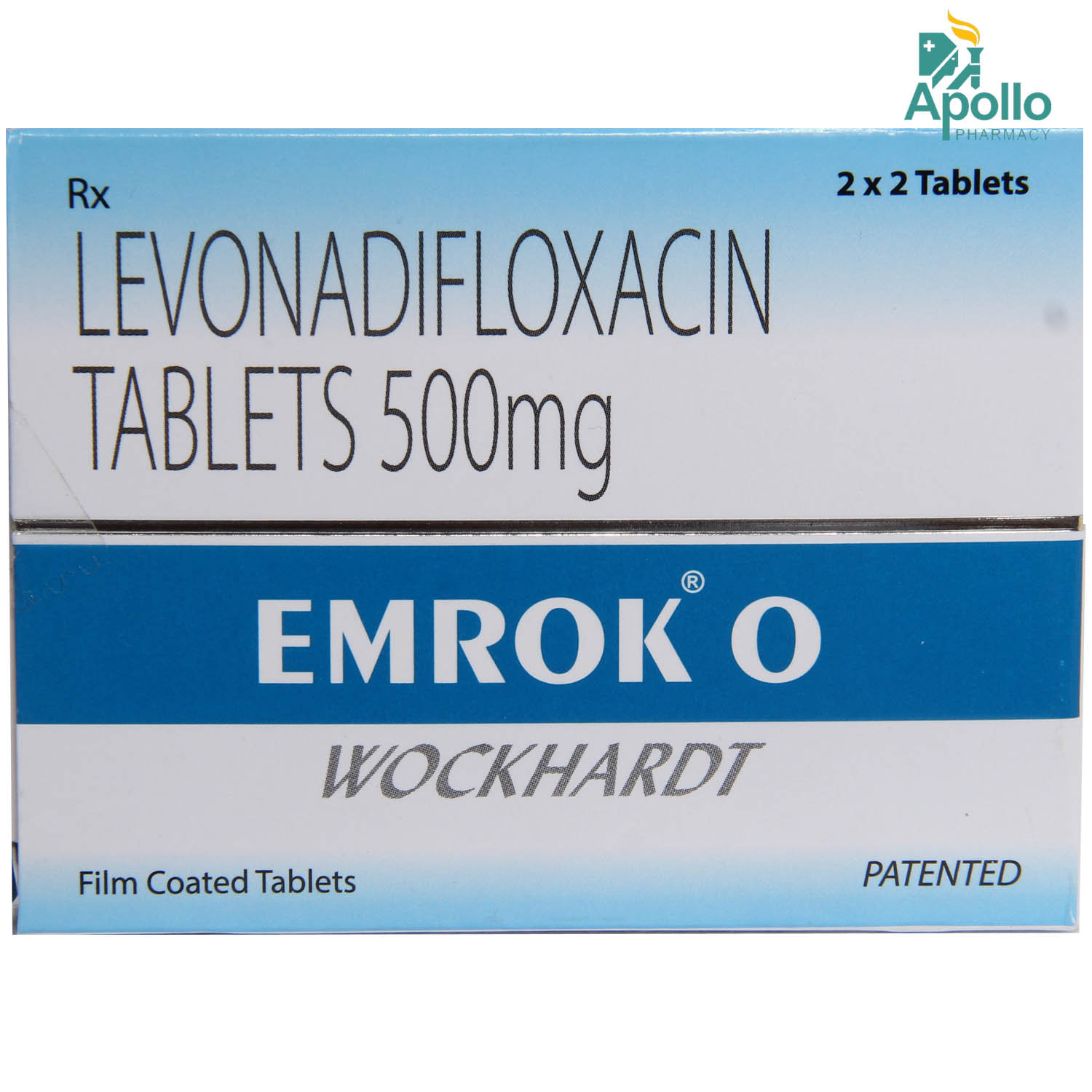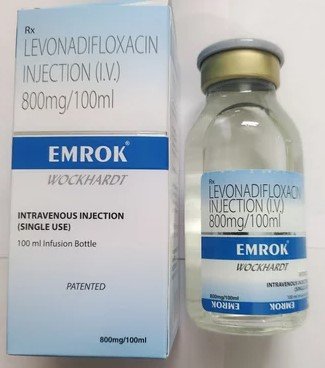Levonadifloxacin
About Levonadifloxacin
Levonadifloxacin belongs to the class of 'antibiotics', primarily used to treat bacterial skin and soft tissue infections, including diabetic foot infections and concurrent bacteraemia (presence of viable bacteria in the bloodstream). It also targets Methicillin-resistant Staphylococcus aureus (MRSA), which causes antimicrobial resistance (AMR).
Levonadifloxacin contains 'Levonadifloxacin,' a bactericidal agent that prevents bacterial growth and interrupts bacterial replication. It is also a beta-lactamase inhibitor. Beta-lactamases are the enzymes produced by the bacteria that inactivate the antibiotic, leading to multi-resistance. Levonadifloxacin has a broad spectrum activity against various pathogens, including Methicillin-resistant Staphylococcus aureus (MRSA), which is a leading cause of rising antimicrobial resistance (AMR).
Take Levonadifloxacin as advised by a doctor. Levonadifloxacin may also cause side effects, although not everybody gets them. Common side effects of Levonadifloxacin include constipation, vomiting, and cough. These side effects do not require medical attention and gradually resolve over time. If these side effects persist longer, please consult your doctor.
Brief your medical history to the doctor if you are allergic to Levonadifloxacin or any of its components. Before starting this medicine, let your doctor know if you have any liver/kidney/heart diseases, diabetes, mental-health-related problems, myasthenia gravis (muscle weakness), tendon-related diseases or peripheral neuropathy (nerve damage). Levonadifloxacin should be used only with a doctor's advice during pregnancy and breastfeeding. Levonadifloxacin is not recommended in patients under 18 years of age.
Uses of Levonadifloxacin
Medicinal Benefits
Levonadifloxacin contains 'Levonadifloxacin,' a broad-spectrum anti-MRSA agent that treats bacterial skin and soft tissue infections, including diabetic foot infections and concurrent bacteraemia. It is a fluoroquinolone antibiotic and is bactericidal in action. It works by inhibiting beta-lactamase, the enzyme produced by the bacteria, which inactivates the antibiotic, leading to multi-resistance.
Directions for Use
Storage
Side Effects of Levonadifloxacin
- Constipation
- Vomiting
- Cough
Drug Warnings
Do not use Levonadifloxacin if you are allergic to Levonadifloxacin or its components. Inform your doctor if you have liver/kidney/heart diseases, diabetes, mental-health-related problems, myasthenia gravis, tendon-related diseases or peripheral neuropathy before starting Levonadifloxacin. Pregnant and breastfeeding should use this medicine only when a doctor has prescribed it. Avoid driving or operating machinery if you notice any dizziness, headache or visual disorders that may impair your ability to concentrate and react. Levonadifloxacin is not recommended in patients under 18 years of age.
Drug Interactions
Drug-Drug Interaction: Levonadifloxacin may interact with antacids (sucralfate), multivitamin preparations containing calcium, zinc or iron, and HIV/AIDS medication (didanosine).
Drug-Food Interaction: No interactions found/established.
Drug-Disease Interaction: Before taking Levonadifloxacin, let your doctor know if you have any liver, kidney or heart diseases, diabetes, or mental-health-related problems.
Drug-Drug Interactions Checker List:
Safety Advice

Alcohol
cautionIt is not known if alcohol consumption affects the action of Levonadifloxacin. Please consult your doctor in case of any concerns.

Pregnancy
cautionLimited information is available. Please consult your doctor before taking Levonadifloxacin if you are pregnant or planning to conceive.

Breast Feeding
cautionThere is limited information available regarding the effect of Levonadifloxacin on breastfeeding. If you are a nursing mother, please consult your doctor before taking Levonadifloxacin.

Driving
cautionIt is not known if Levonadifloxacin affects your ability to drive. Drive or operate machinery only if you are alert.

Liver
cautionLet your doctor know if you have a pre-existing or a history of liver disease before taking Levonadifloxacin. Your doctor may adjust the dose or prescribe a suitable alternative based on your condition.

Kidney
cautionLet your doctor know if you have a pre-existing or a history of kidney disease before taking Levonadifloxacin. Your doctor may adjust the dose or prescribe a suitable alternative based on your condition.

Children
unsafeLevonadifloxacin is not recommended in children under 18 years of age.
Habit Forming
Diet & Lifestyle Advise
- Wash your hands often to maintain cleanliness.
- Avoid sharing personal items like shaving razors.
- Include whole-grain foods in your diet.
- Taking probiotics after an antibiotic treatment reduces the risk of antibiotic-associated diarrhoea.
- Try taking yoghurt, cheese, sauerkraut, and kimchi that help restore the intestine's good bacteria.
- Include more fibre-enriched food in your diet that is easily digested by your gut bacteria. Fibre foods may also help restore healthy gut bacteria after treatment with antibiotics.
- Avoid intake of alcoholic beverages as they can make you dehydrated and affect your sleep.
- Manage stress, eat healthily, drink plenty of water, exercise regularly, and sleep well.
Special Advise
- There is an increased risk of tendinitis and tendon rupture following fluoroquinolone (like Levonadifloxacin) therapy; hence a cautious use of Levonadifloxacin is recommended.
- Levonadifloxacin may cause mental health-related side effects; hence patients with mood disorders should take advice accordingly.
- Monitor your blood sugar levels regularly since Levonadifloxacin may affect your glucose levels in diabetes.
- Clostridium difficile-associated diarrhoea (CDAD) is reported during the usage of antibiotics. Please see your doctor if you experience prolonged diarrhoea.
Patients Concern
Disease/Condition Glossary
Bacterial skin and skin structure infections: Bacterial skin and skin structure infections occur when bacteria infect the skin through the skin and soft tissues (mucous membrane and loose connective tissue). Skin redness, pain, tenderness, minor bumps or boils, rashes, blisters, cracked/dry skin, swelling, stinging or burning sensation, pus formation, and itching are all symptoms. Cellulitis (red and swollen skin), erysipelas (large patches of skin), impetigo (red sores on the face), furuncles, and carbuncles are all examples of common bacterial infections.
FAQs
Levonadifloxacin contains Levonadifloxacin which works by interfering with bacterial replication and preventing the growth of the bacteria causing major skin infections.
Levonadifloxacin may cause constipation. Drink lots of fluids and eat fibre-rich food if you experience constipation. If the condition persists or worsens, consult your doctor.
Levonadifloxacin is a novel broad-spectrum anti-MRSA benzoquinolizine quinolone agent with potent bactericidal action against gram-positive, quinolone-susceptible gram-negative, anaerobic and atypical bacteria.
Levonadifloxacin may be indicated for treating diabetic foot infections, the most common complication of diabetes mellitus.
Diabetic patients should use Levonadifloxacin only when prescribed by a doctor. This medicine may cause disturbances in blood glucose, including both hypoglycaemia and hyperglycaemia, usually in diabetic patients receiving concomitant treatment with an oral hypoglycaemic agent (like sulphonyl urea) or with insulin. Hence, if you have diabetes and notice symptoms like confusion, dizziness, headache, shakiness, sweating, pounding heart or trembling while using Levonadifloxacin, please contact your doctor immediately.
Take Levonadifloxacin at least 2 hours before or 6 hours after antacids containing magnesium, aluminium, or sucralfate since these components may interfere with the medicine's absorption.
Levonadifloxacin may cause low blood sugar levels and mental health-related side effects; hence, you should take a doctor's advice before starting this medicine.





